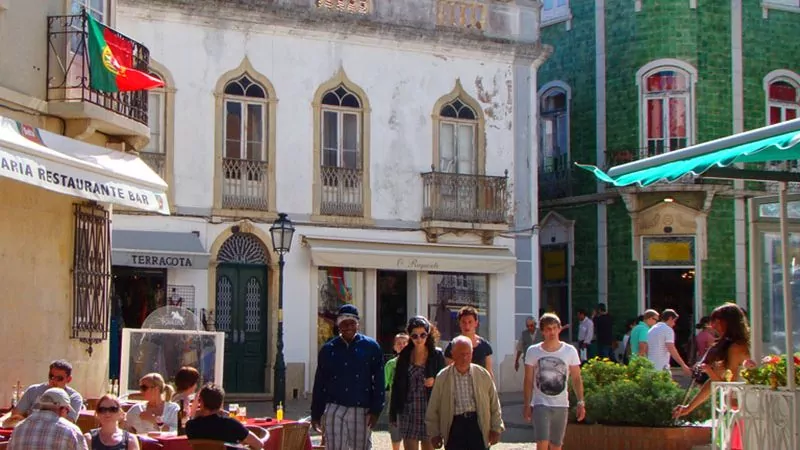
How The Property Market In Lagos, Portugal, Could Earn You 25%
How I Earned 25% In Portugal In The Past 12 Months
After last week’s Live and Invest in Portugal Conference in Carvoeiro, my family and I spent the weekend in Lagos in the apartment I bought after last year’s conference in this part of the world.
At the time, last July, local contacts were telling me that Algarve real estate markets were finally turning a corner after more than six years down in the dumps. Values were beginning to appreciate.
Prices were indeed good last year in general, but the apartment I bought was an extraordinary bargain.
The seller needed out. She had a mortgage she wanted to get out from under.
Today, the property is set up for short-term rental and has been fully booked since May. Fortunately, I reserved the few days for this visit well in advance.
In regrouping on the market on the ground this year, prices are definitely up.
Before arriving in Lagos, I estimated that my apartment was probably worth 15% more than I paid for it last year. I got a great price, so I figured 15% wasn’t much of a stretch. As it turns out, it’s worth closer to 25% more than it was last year this time. The market in general feels like it’s up at least 10% on average.
Definitely, there are more higher-priced properties on the market.
Last year, when I asked about the dearth of larger, higher-value properties, several agents told me that that end of the market was holding on rather than trying to sell into a down market. Today, the number of three-bedroom villas available for sale is many times what it was last year.
What To Expect From The Property Market In Lagos
Prices are reasonable to good, but bargains like the one I found last year are unlikely unless you do some deep groundwork.
As a consequence of higher property prices, rental yields have gone down. Last year, most of the properties I looked at projected an 8% net yield at least. This year, the majority of properties are projected to yield in the 5% to 6% range, though I have seen some with histories to suggest that up to 8% is possible. However, unlike last year, nothing I’ve seen is now projecting better than 8%.
While better than 8% is great if you can get it, the truth is, you usually can’t and ordinarily you shouldn’t expect to. A net annual yield of 5% to 8% is a reasonable expectation across most markets most of the time.
In addition, in Lagos right now, you should be able to expect appreciation in the value of most any property you might buy here, although not the 25% I’ve seen over the past 12 months. I’d say you could look for 5% to 15% if you buy right.
Prices are up nicely for the property market in Lagos this year compared with last… and so are tourist volumes. The restaurants and beaches are noticeably more crowded this year than last for the same week.
All the Brits would have booked before the Brexit vote and the devaluation of the pound. However, the mix of tourists, from French and Germans to Swedes and a good number of Americans, suggests that the Algarve may not have to worry too much about the Brexit aftermath.
The U.S. dollar stands today versus the euro more or less where it was this time last year, meaning the window for Americans to buy into this market at a relatively strong rate of exchange continues. I’m looking at further investment options in Lagos, as well as current opportunities in Lisbon.
This time I’m thinking a renovation project is probably the way to go. Colleagues are looking at buildings in Lisbon.
In addition, across the street from my apartment in Lagos is a two-story corner building of character just begging to be bought and renovated… if it is for sale. I’m meeting my property manager this afternoon to see if she can find out who the owners are and whether they’d be interested in selling.
Despite the price increases of the past year, my bottom-line position is that Portugal still offers very good opportunities for real estate investment.
One thing to take into account when considering a rental investment in the Algarve, specifically, is how the rental projection numbers are being presented to you. The Algarve has a 10- to 12-week high season, during which you can generally be assured your property will see full occupancy regardless of the location. The shoulder seasons in April, May, September, and October also attract renters, but, during these lesser seasons, your property will need to be in a good location to get decent occupancy. The other five months of the year, you or your property manager will need to put some work into keeping the place rented. It’s possible, but, again, it takes effort and some imagination.
Conservative real estate agents, I’ve noticed, make rental projections for this market based on high season occupancy only. Those numbers generally work out to a 4% to 5% net yield. Agents take the position that any return you’re able to generate outside peak season, you should consider as bonus yield.
I think that thinking could be a bit over-conservative. Buy right, and you should be able to rent outside June, July, and August.
And, of course, during the shoulder and off seasons, you could use the place yourself. The weather in this part of the world is better than pleasant 12 months a year, and the sun shines year-round.
Lief Simon



